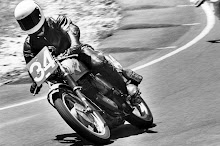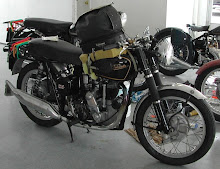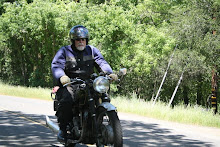Motor Industry Research Association...a facility based at Lindley near Nuneaton in the UK....
Now as readers of my blog will be aware I've lots of literature accumulated over the years and having been involved in automotive and motorcycle instrumentation, I have a good selection to cover this aspect of my life.
I was looking back through some "Smiths Automobile Review", an in house magazine from the Smiths Instrument group and an article in #11 of 1956 forms the basis for this posting.( acknowledgement to Smiths Industries for these)....
The article in question was on M.I.R.A , now I don't intend this post to be a formal treatise on the body in question, just a general look to bring you perhaps a little more knowledgeable on it....so lets read through the items and I've a few additional comments.
Before this I was in touch with motorcycle historian Peter Jones from Canberra and he offered some initial comment.
"....Formed in 1946, I believe with financial support from the British Govt. About 1/2 of the finances were raised from within the Motor Industry. This was seen as a necessity in the Motor Industry to allow for proper high speed testing of British cars to give them an edge over those being produced overseas - especially Germany
Around forty or so sites were initially looked at, inc both Donnington and Silverstone, before settling on a ex wartime RAF airfield at Lindley. This was named after a nearby farm called Lindley Hall Farm - sometimes known as 'The Geographical Centre' of UK
The facilities first became available to motor car manufacturers in Oct 1948, when Jaguar (I believe?) took a prototype sportscar there for secret testing. This car later (several years) evolved into the E Type. I understand Triumph were the first motor cycle users, testing a twin cylinder 500 there in 1949. Initially it was quite relaxed, where both cars and bikes might both be on the track at the same time - as it was quite expensive to book the facilities for sole use. Later, as safety became more and more an issue, this relaxed approach disappeared. It seems that both Velo and Vincent looked at MIRA for their speed record attempts, (the 24 hour record), but both found the cost too prohibitive, and went elsewhere.
The current HQ was completed in about 1954, and a wind tunnel - the first for motor cars - was opened in 1959. This was modelled on the wind tunnel used at Farnborough for aircraft testing.
MIRA have a web site which might be worth visiting - On the 'The MIRA Estate' section they had a historical pic showing an aerial view of the track as it was, and another as it is today. Unfortunately I do not have any photos of MIRA - but I'm reasonably sure that there would have been photos in the press of the day - 'Motor" for example, which can be researched on-line..."
The association does have a website and worth a look at...
M.I.R.A in 1956.....
White china clay similar to tropical desert dust, used for testing.
Smiths Industries tested waterproofing of instruments...these used on the Austin Champ 4 x 4 and Ferret Scout car.
As I mentioned, M.I.R.A is mentioned in Motorcycling road tests, so I've added some items from the "MotorCycling" Road Test series, between 1958 and 1961 ( acknowledgement to Morton's Motorcycle Media for these)....
The famous Velocette registration number "SOX-631", above in Venom Clubman form doing a stint at M.I.R.A.
This formed the basis for the successful 100mph for 24 hour attempt in March 1961 at Montlehery in France.
A Panther on the test hill and a Viper on full throttle...































No comments:
Post a Comment